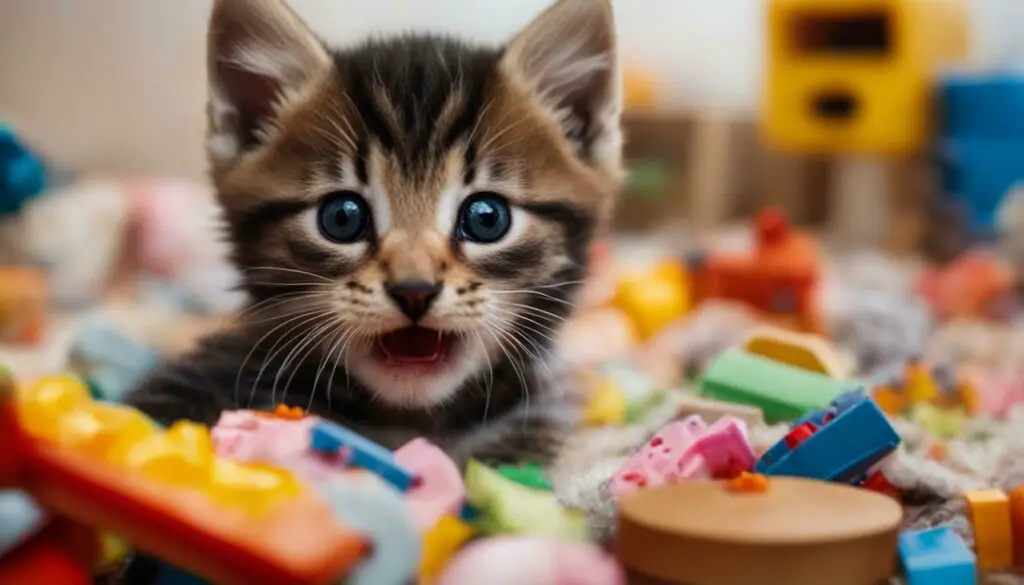If your kitten won’t stop biting, don’t worry! There are several techniques you can try to curb this behavior and promote a friendlier environment at home.
Biting is a natural behavior for kittens as they explore their world and play. Kittens learn bite inhibition through playtime with littermates. It’s important to provide appropriate toys for your kitten to play with and avoid using your hands or feet. Use playtime as bonding time and try using wand toys to redirect their attention.
If your kitten bites you, say “OW!” in a loud voice, gently remove your body part, place them on the floor, and redirect their attention to a toy. Consistency is key in training, and your kitten will learn over time. Punishment is not recommended as it can make cats fearful.
Provide plenty of stimulation and play with your kitten using engaging toys. Reward good behavior with treats or meals. Redirect any biting behaviors towards appropriate targets. Consider getting your kitten a friend if they’re a solo kitten, as having a playmate can help with their energy and teach them biting boundaries.
Key Takeaways:
- Provide appropriate toys for your kitten to play with.
- Avoid using your hands or feet as play objects.
- Use wand toys to redirect your kitten’s attention.
- Consistency is key in training.
- Reward good behavior and redirect biting towards appropriate targets.
Understanding Kitten Biting Behavior
Before we delve into the training tips, it’s important to understand why your kitten is biting in the first place. Biting is a natural behavior for kittens as they explore their world and play. When kittens are in a litter, they learn bite inhibition through playtime with their littermates. This means they learn to control the force of their bites and understand when biting is appropriate.
There are several reasons why your kitten may be biting. One common reason is teething. Just like human babies, kittens go through a teething stage where their gums are itchy and sore. They may bite to alleviate discomfort. Another reason is socialization. Kittens that haven’t had proper socialization may resort to biting when they feel scared or threatened. Additionally, kittens may bite as a form of play or to gain attention. Understanding the underlying motivation for your kitten’s biting behavior can help you address it effectively.
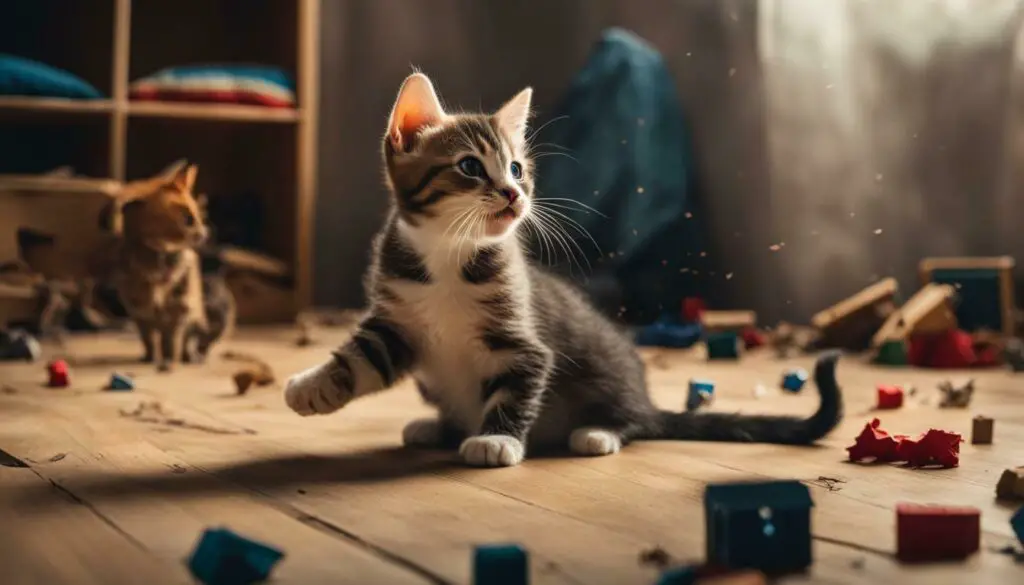
Dealing with a Biting Kitten
Now that we understand why kittens bite, let’s explore some effective strategies for training them to stop biting inappropriately. It’s important to provide appropriate toys for your kitten to play with. Interactive toys that mimic prey, such as wand toys, can be particularly effective in redirecting their attention from biting your hands or feet. By engaging in playtime with your kitten, you not only provide them with mental and physical stimulation but also establish a bond and trust.
If your kitten bites you during playtime, it’s crucial to react appropriately. Say “OW!” in a loud voice to startle them and gently remove your body part from their reach. Place them on the floor and redirect their attention to a toy. This teaches them that biting humans leads to the end of play, while biting toys is encouraged. Consistency is key in training your kitten, and with time, they will learn to associate biting with negative consequences and redirect their behavior.
| Tips for Training a Biting Kitten |
|---|
| Provide appropriate toys for play |
| React with a loud “OW!” and redirect to a toy |
| Be consistent in your training |
| Avoid punishment, as it can make cats fearful |
| Offer plenty of stimulation and play |
| Reward good behavior with treats or meals |
| Consider getting your kitten a playmate |
By following these tips and understanding the reasons behind your kitten’s biting behavior, you can effectively train them to stop biting inappropriately. Remember to be patient and provide plenty of love and positive reinforcement throughout the training process. With time, your kitten will learn to redirect their biting energy and become a well-behaved and happy companion.
Nurturing Bite Inhibition Through Playtime
One way to train your kitten to stop biting is through nurturing bite inhibition during playtime. Biting is a natural behavior for kittens as they explore their world and play. It’s important to understand that kittens learn how to control the strength of their bite through interaction with their littermates. By providing positive playtime experiences, you can help teach your kitten appropriate biting behavior.
During playtime, make sure to provide your kitten with a variety of engaging toys. These toys should be specifically designed for cats and encourage healthy play behaviors. Wand toys, for example, are great for redirecting your kitten’s attention and allowing them to engage in interactive play. By using wand toys, you can redirect their biting behavior towards the toy and away from your hands or feet.
If your kitten does bite you during playtime, it’s important to react appropriately. Say “OW!” in a loud voice to startle them, gently remove your body part from their grasp, and place them on the floor. Immediately redirect their attention to a toy and encourage them to play with it instead. Consistency is key in training, so make sure to repeat this process every time your kitten bites. Over time, they will learn that biting is not acceptable and that toys are the appropriate objects for play.
| Training Tips: | Solutions: |
|---|---|
| Provide appropriate toys for playtime. | Redirect biting behavior towards toys. |
| React with a loud “OW!” when bitten. | Consistently remove body part and redirect to a toy. |
| Use wand toys to engage and redirect their attention. | Encourage positive playtime experiences. |
Remember, punishment is not recommended as it can make cats fearful and hinder the training process. Instead, focus on providing a stimulating environment for your kitten, with plenty of playtime and interactive toys. Reward good behavior with treats or meals, and redirect any biting behaviors towards appropriate targets. If your kitten is a solo kitten, consider getting them a feline companion to help with their energy and teach them biting boundaries.
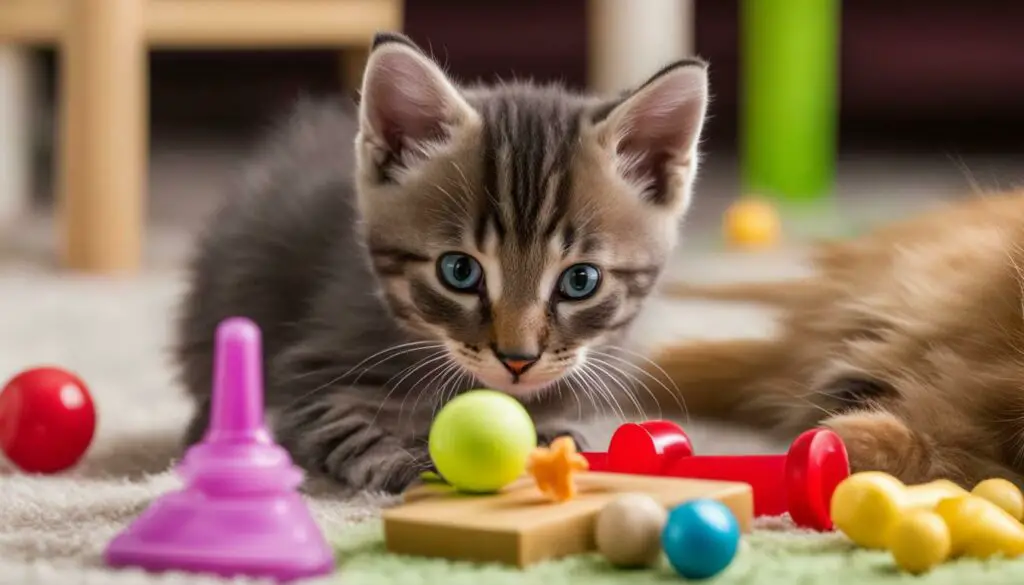
By following these training tips and solutions, you can help guide your kitten towards developing good bite inhibition and appropriate play behavior. With patience and consistent training, your kitten will learn to stop biting and enjoy playtime without causing harm or discomfort.
Providing Appropriate Toys
To redirect your kitten’s biting behavior, it’s crucial to provide them with a variety of engaging toys. Kittens have a natural instinct to bite and scratch, so having appropriate toys can help satisfy their need for play and exploration while preventing them from targeting inappropriate objects or your body parts. Interactive toys, such as feather wands or puzzle toys, can keep your kitten entertained and mentally stimulated.
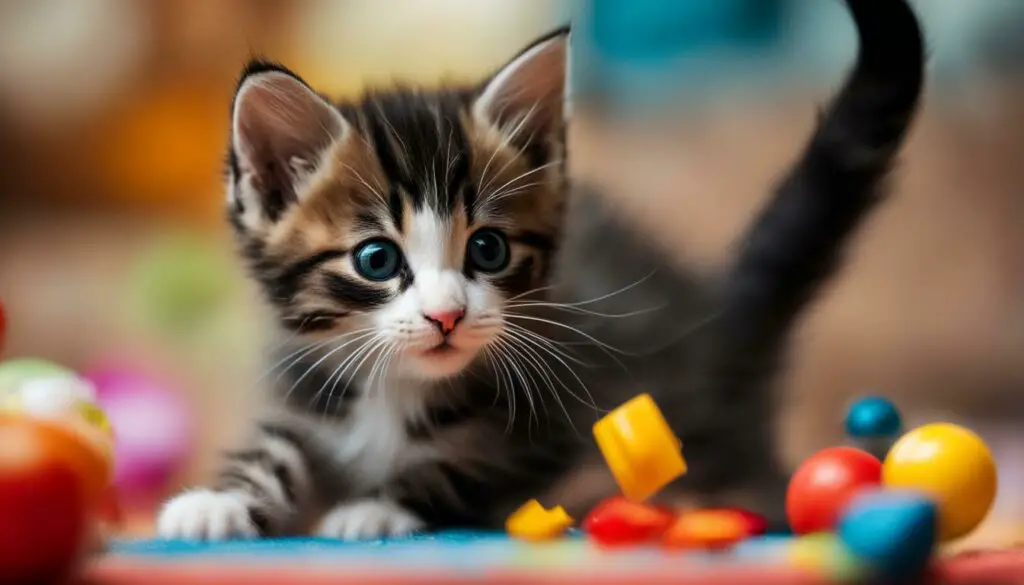
When choosing toys for your kitten, opt for ones that are safe, durable, and interactive. Avoid toys with small parts that can be easily chewed off and swallowed. Look for toys specifically designed for cats, such as balls, mice, or treat-dispensing toys. These toys can keep your kitten engaged and provide them with an outlet for their natural biting and hunting instincts. Rotate the toys regularly to keep them interesting and maintain your kitten’s engagement.
In addition to providing appropriate toys, it’s important to make playtime a bonding experience. Engage your kitten in interactive play, using the toys to mimic prey and encouraging them to chase, pounce, and bat at the toys. This not only redirects their biting behavior but also helps build a strong bond between you and your kitten. Remember to always supervise playtime and avoid using your hands or feet as play objects to prevent your kitten from associating them with biting.
| Key Tips to Prevent Kitten Biting |
|---|
| Provide a variety of engaging toys to redirect biting behavior. |
| Choose safe, durable, and interactive toys designed for cats. |
| Rotate toys regularly to maintain your kitten’s interest. |
| Make playtime a bonding experience between you and your kitten. |
| Avoid using your hands or feet as play objects. |
Avoiding the Use of Hands or Feet
While it may be tempting to use your hands or feet as playthings, it’s essential to avoid this behavior to prevent your kitten from developing a biting habit. Kittens naturally engage in play-fighting with their littermates, but when they transfer this behavior to humans, it can become problematic. By using your hands or feet as play objects, you unintentionally reinforce the idea that biting is an acceptable form of play. This can lead to a habit that is difficult to break as your kitten grows older.
Instead, provide appropriate toys that are designed for cats to chew and bite. These toys can help redirect their biting behavior towards acceptable targets. Look for interactive toys with feathers, strings, or small bells that can engage your kitten’s attention and mimic hunting instincts. Having a variety of toys available will help keep your kitten entertained and provide alternative outlets for their natural biting behavior.
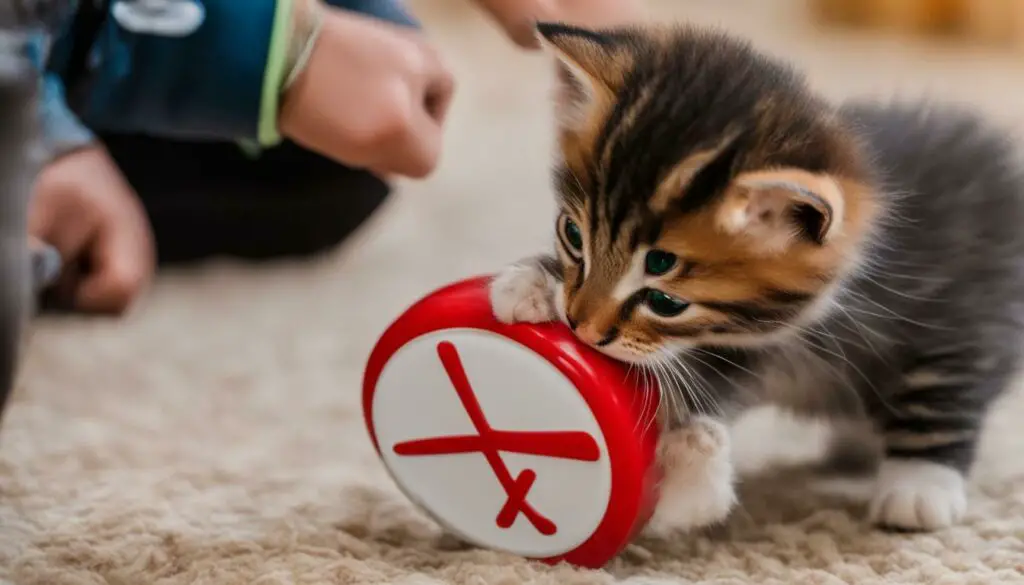
In addition to providing toys, it’s important to establish boundaries with your kitten. Whenever they attempt to bite your hands or feet, respond with a firm “OW!” in a loud voice to startle them and let them know that biting is not acceptable. Gently remove the body part they were biting and place them on the floor. Immediately redirect their attention to a toy or another appropriate object. Consistency is key in this training approach. Your kitten will gradually learn that biting humans leads to the termination of play, while biting toys keeps the fun going.
Remember, punishment or physical discipline is not recommended as it can make cats fearful and damage the trust between you and your kitten. Instead, focus on positive reinforcement by rewarding good behavior. Whenever your kitten engages in appropriate play behavior or shows restraint in their biting, offer praise and treats. This will reinforce the desired behavior and encourage them to continue behaving well.
Using Wand Toys for Redirection
If your kitten won’t stop biting, there are training tips and solutions you can try. Biting is a natural behavior for kittens as they explore their world and play. Kittens learn bite inhibition through playtime with littermates. It’s important to provide appropriate toys for your kitten to play with and avoid using your hands or feet. Use playtime as bonding time and try using wand toys to redirect their attention.
Wand toys can be a helpful tool in redirecting your kitten’s biting behavior and encouraging them to engage in interactive play. These toys, with feathers, strings, or other enticing attachments, can capture your kitten’s interest and provide a suitable target for their playful bites. By waving the wand toy in front of your kitten, you can redirect their biting behavior away from your hands or feet and onto the toy.
Remember, consistency is key in training, so whenever your kitten starts biting you, grab the wand toy and use it as a distraction. Encourage your kitten to pounce, chase, and play with the wand toy instead of biting. This will not only redirect their attention but also teach them that appropriate play involves toys, not hands or feet.
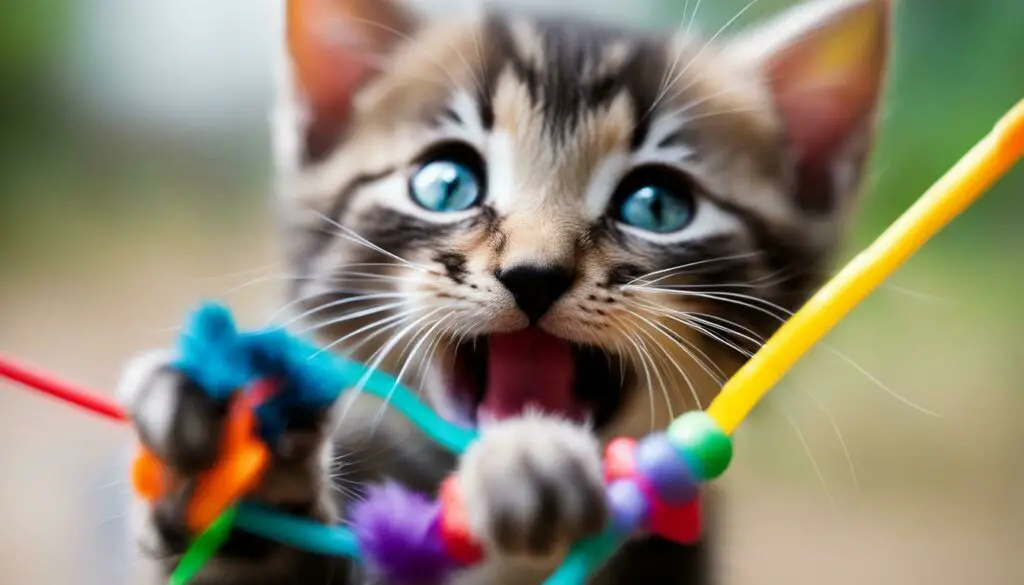
| Benefits of Using Wand Toys for Redirection: |
|---|
| 1. Safe play: Wand toys keep your hands at a safe distance from your kitten’s sharp teeth, reducing the risk of accidental bites and scratches. |
| 2. Mental stimulation: The interactive nature of wand toys engages your kitten’s mind and provides mental stimulation, helping to redirect their energy away from biting. |
| 3. Physical exercise: Playing with wand toys allows your kitten to burn off excess energy through active play, which can reduce biting tendencies. |
Tip: Play It Safe
When using wand toys, it’s important to prioritize safety. Always supervise your kitten during playtime and never leave them unattended with the toy. After play sessions, store the wand toy in a safe place where your kitten cannot access it, preventing them from accidentally swallowing any small parts.
- Choose wand toys that are sturdy and made with safe materials to avoid any potential hazards.
- Regularly inspect the toy for any signs of wear and tear. If the wand toy becomes damaged, replace it immediately to prevent any accidents.
Redirecting your kitten’s biting behavior with wand toys can be a fun and effective way to train them to play appropriately. Remember to be patient and consistent in your training efforts, and over time, your kitten will learn to redirect their biting instincts towards more appropriate targets. With the right tools, guidance, and plenty of playtime, you can help your kitten become a well-behaved and happy companion.
Summary:
If your kitten won’t stop biting, try using wand toys to redirect their attention and encourage interactive play. Wand toys provide a safe and engaging target for your kitten’s biting behavior, helping them learn appropriate play. Playtime with wand toys also offers mental stimulation and physical exercise, reducing biting tendencies. Remember to prioritize safety, supervise playtime, and choose sturdy toys. With patience, consistency, and plenty of play, you can guide your kitten towards healthy and safe play habits.
Handling Bites Effectively
When your kitten bites, it’s important to respond appropriately to discourage the behavior without resorting to punishment. Biting is a natural behavior for kittens as they explore their world and play. It’s their way of learning and testing boundaries. However, as a pet owner, it’s crucial to teach them that biting is not acceptable.
One effective method is to let out a loud “OW!” in response to the bite. This will startle your kitten and cause them to pause. It’s important to remain calm and avoid using any form of physical punishment. Instead, gently remove your body part from their mouth and place them on the floor. Redirect their attention to a toy or other appropriate target. By consistently doing this, you’re teaching them that biting humans is not allowed and redirecting their behavior towards something more desirable.
Consistency is key when training your kitten. They may not learn overnight, but with patience and persistence, they will begin to understand that biting is not acceptable. It’s important to remain consistent in your responses and offer alternatives for them to redirect their biting behavior. Remember to reward good behavior with treats or meals and provide plenty of stimulation and playtime. Engaging toys and interactive play sessions will help redirect their energy in a positive way.
| Tip: | Avoid using your hands or feet as play objects. This may encourage biting behavior, as kittens may not be able to differentiate between play and aggression. Instead, provide them with appropriate toys that they can bite and chew on. |
|---|---|
| Quote: | “Patience and consistency are key when training your kitten to stop biting. With time and the right approach, your kitten will learn to redirect their biting behavior towards appropriate targets.” – Me |
Lastly, if your kitten is a solo kitten, you may want to consider getting them a playmate. Having another feline companion can help tire them out and teach them biting boundaries. It’s important to introduce the new cat slowly and monitor their interactions to ensure they get along well.
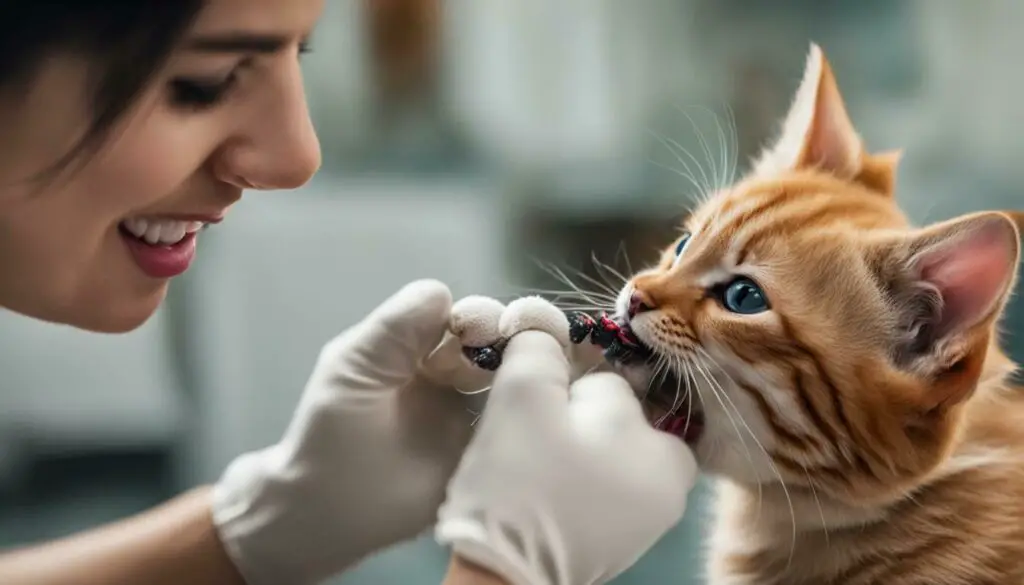
Remember, training a kitten to stop biting takes time and patience. With consistent training, positive reinforcement, and appropriate redirection, your kitten will learn to control their biting behavior. If you’re still struggling to manage your kitten’s biting, consult with a veterinarian or a professional animal behaviorist for further guidance.
Consistency in Training
Training your kitten to stop biting requires consistent effort and repetition over time. It’s important to establish clear boundaries and redirect their behavior towards appropriate targets. Punishment is not recommended as it can make cats fearful and hinder the training process. Instead, focus on positive reinforcement and reward good behavior with treats or meals.
One effective method to discourage biting is to say “OW!” in a loud voice when your kitten bites you. This will startle them and make them understand that biting hurts. Gently remove your body part from their mouth and place them on the floor. Immediately redirect their attention to a toy or another play object. This will teach them that play should involve appropriate biting targets.
Consistency is key in training your kitten. Reinforce the desired behavior each time and avoid giving mixed signals. Provide plenty of stimulation and play with your kitten using engaging toys that encourage active play. Wand toys are particularly useful in redirecting their attention away from biting and towards interactive playtime. Remember to always supervise play sessions and ensure the toys are safe for your kitten to play with.
| Training Tips for Stopping Kitten Biting |
|---|
| Use positive reinforcement and reward good behavior |
| Redirect biting towards appropriate toys and play objects |
| Avoid using punishment or harsh methods |
| Consistency is key – be patient and repeat training exercises |
| Provide stimulating and engaging toys for playtime |
| Consider getting a playmate for your kitten |
Patience and Time
Training a kitten to stop biting takes time, patience, and understanding. Remember that biting is a natural behavior for kittens, and they need guidance to learn what is acceptable and what is not. Be consistent in your approach, provide plenty of playtime and stimulation, and reward good behavior. With time, your kitten will learn to redirect their biting instincts towards appropriate targets, and you can enjoy a harmonious relationship with your furry friend.
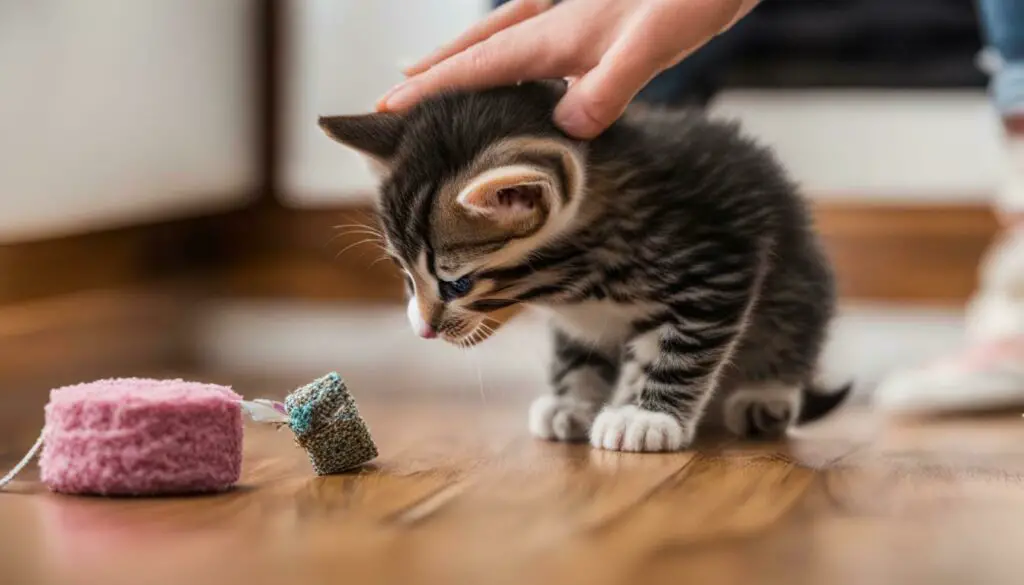
Rewarding Good Behavior
Positive reinforcement through rewards can be a powerful tool in training your kitten to stop biting. By rewarding good behavior, you are encouraging your kitten to repeat desired actions while discouraging biting. It’s important to establish clear boundaries and redirect their biting behavior towards appropriate targets.
When your kitten engages in play without biting, praise them with words of encouragement and offer a small treat or their favorite meal. This positive association reinforces the idea that playing without biting is rewarding. Additionally, you can use a clicker during training sessions to mark the desired behavior, followed by reward.
Remember to redirect any biting behavior towards appropriate toys or objects. Keep a selection of interactive, chewable toys readily available for your kitten to play with. When they display biting tendencies, gently remove your body part and replace it with a toy. This teaches your kitten that biting humans is not acceptable, but chewing on toys is encouraged.
| Rewarding Good Behavior Tips |
|---|
| 1. Offer verbal praise and encouragement |
| 2. Provide small treats or favorite meals as rewards |
| 3. Use a clicker to mark desired behavior and follow with a reward |
| 4. Redirect biting behavior towards appropriate toys or objects |
| 5. Keep a variety of interactive toys available for playtime |
Consistency is key when using positive reinforcement as a training method. Be patient with your kitten and offer rewards consistently for good behavior. Over time, they will learn that gentle play is more rewarding than biting. Avoid using punishment or yelling, as this can create fear and damage the trust between you and your kitten.
By rewarding good behavior, redirecting biting, and providing appropriate toys, you can effectively train your kitten to stop biting. This training process takes time and patience, but with consistency and positive reinforcement, you will see progress. Remember to always approach training with love and understanding, creating a bond with your kitten that will last a lifetime.
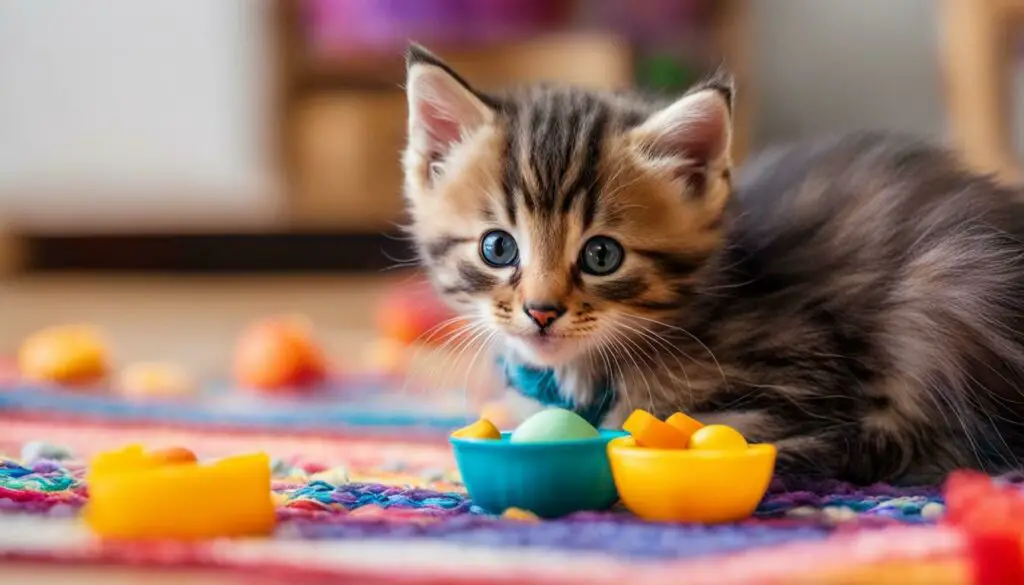
Providing Stimulation and Play
A well-stimulated and engaged kitten is less likely to resort to biting as a form of play or attention-seeking behavior. To keep your kitten entertained and satisfied, it’s important to provide them with plenty of stimulation and playtime activities. This will not only help redirect their energy but also strengthen the bond between you and your feline friend.
One great way to provide stimulation is through interactive toys. These toys engage your kitten’s natural instincts and help channel their energy into appropriate play. Consider toys that mimic prey, such as wand toys with feathers or strings, as they can be highly engaging for your kitten. Additionally, puzzle toys that dispense treats can provide mental stimulation and keep your kitten entertained for hours.
Another essential aspect of playtime is active participation from you. Get down on their level and actively engage with your kitten by using wand toys or playing gentle games of chase. This will not only help them burn off excess energy but also teach them appropriate play behavior. Remember to avoid using your hands or feet as play objects, as this can encourage biting and lead to unintentional reinforcement of the behavior.
| Playtime Tips: |
|---|
| Choose toys that are safe and appropriate for your kitten’s age and size. |
| Rotate toys regularly to keep playtime exciting and prevent boredom. |
| Use positive reinforcement, such as treats or extra attention, to reward your kitten’s good behavior during playtime. |
| Set aside dedicated playtime sessions each day to ensure your kitten receives enough attention and stimulation. |
Remember, training your kitten to stop biting takes time and consistency. Be patient and continue to provide them with appropriate outlets for their natural instincts. With the right guidance and plenty of love, you can help your kitten develop into a well-behaved and happy member of your family.
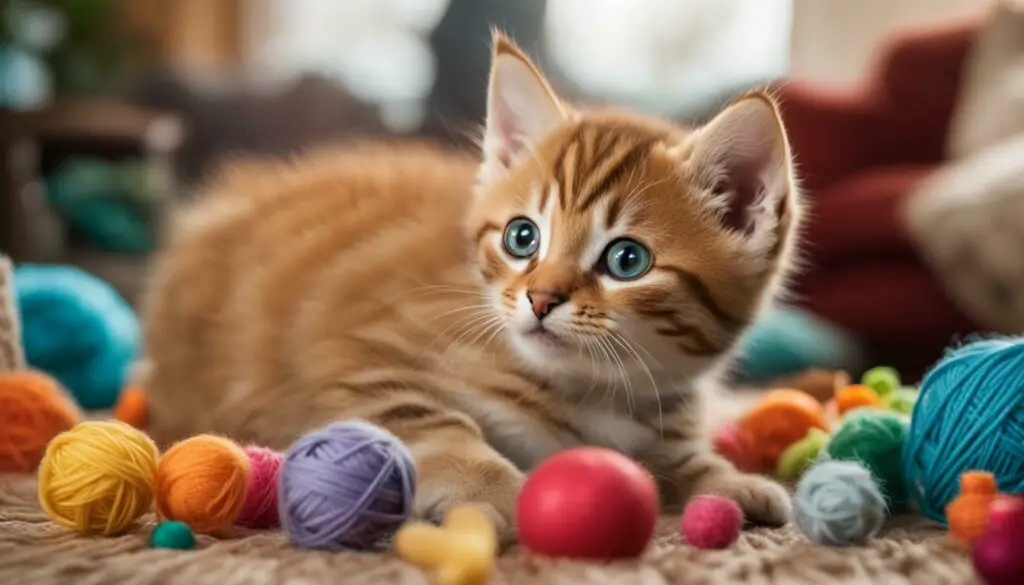
In the next section, we will discuss the benefits of considering a playmate for your kitten and how having another feline companion can help redirect their biting energy and teach them boundaries.
Consider Getting a Playmate
If your kitten is a solo pet, getting them a feline playmate can provide an outlet for their energy and help in teaching them proper biting boundaries. Kittens are naturally curious and energetic, and having a playmate can give them a companion to engage in play and socialize with.
Introducing a new kitten or cat to your household can be an exciting and rewarding experience. It’s important to consider factors such as age, temperament, and compatibility when choosing a playmate for your existing kitten. By selecting a playmate that matches your kitten’s energy level and personality, you can create a harmonious environment where both cats can thrive.
When introducing the new playmate, it’s essential to provide a gradual and controlled introduction process. Start by keeping the new kitten in a separate room with their own food, water, litter box, and toys. This will allow both cats to become familiar with each other’s scents and gradually introduce them through scent swapping and supervised interactions.
| Benefits of Getting a Playmate for Your Kitten: | Considerations for Introducing a New Playmate: |
|---|---|
|
|
Adding a feline playmate can be a wonderful solution for a biting kitten. It not only gives them an outlet for their energy but also helps them learn proper biting boundaries from another cat. Remember to provide a gradual and controlled introduction, monitor their interactions, and ensure each cat has their own resources to minimize any potential conflicts. With patience and time, your kittens will form a strong bond and enjoy a playful and harmonious relationship.
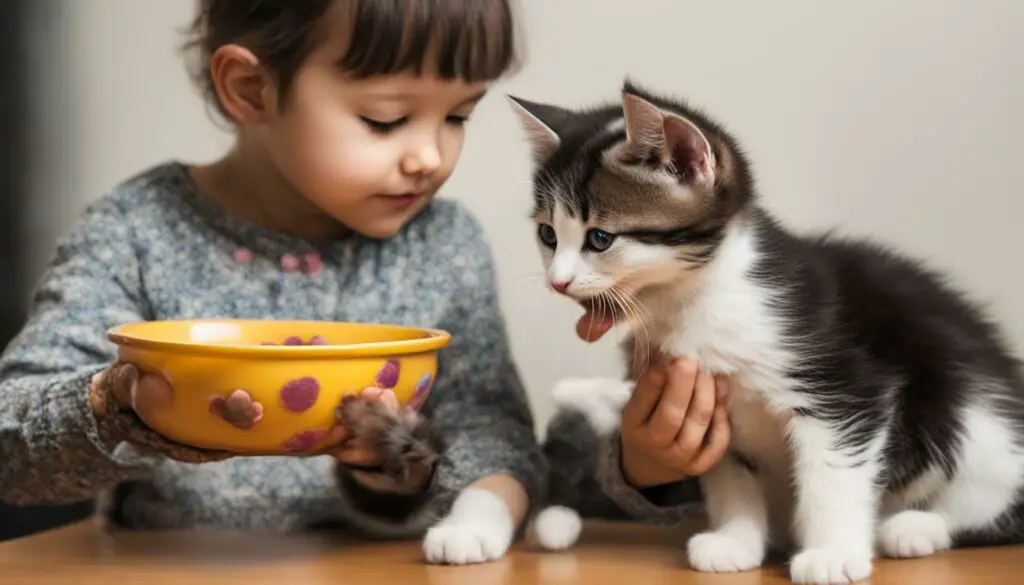
Patience and Time
Teaching your kitten to stop biting requires patience and understanding as they learn new behaviors and boundaries. Biting is a natural behavior for kittens as they explore their world and play. Just like human babies, kittens use their mouths to investigate and interact with their surroundings. However, it’s important to train them to redirect their biting behavior towards appropriate targets and prevent it from becoming a habit.
One effective method to teach your kitten bite inhibition is through playtime. Kittens learn this skill from their littermates, who will yelp or stop playing when bitten too hard. When your kitten bites you, make a high-pitched noise like “OW!” in a loud voice to mimic this response. Gently remove your body part from their reach and place them on the floor. Then, redirect their attention towards a toy or a scratching post to provide an alternative outlet for their energy.
Consistency is key in training your kitten to stop biting. Reinforce the desired behavior by rewarding them with treats or meals when they play gently and avoid biting. On the other hand, avoid using punishment or negative reinforcement, as it can make your cat fearful and hinder the training progress. Remember, training takes time, and every kitten learns at their own pace. Be patient and consistent in your approach, and you will see gradual improvements in their behavior over time.
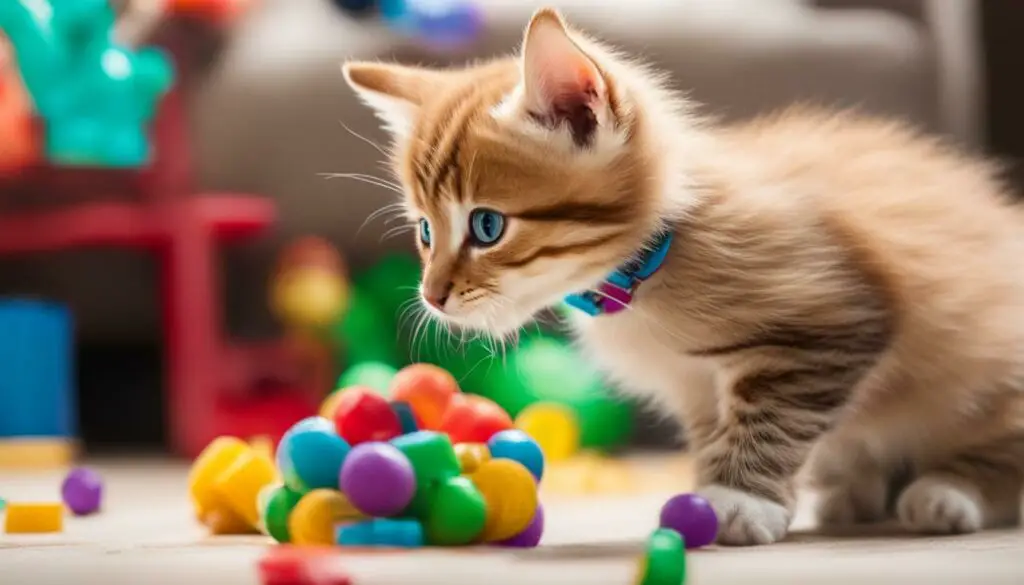
Conclusion
By implementing the training tips and solutions mentioned in this article, you can successfully guide your kitten towards curbing their biting behavior and fostering a harmonious relationship in your home.
If your kitten won’t stop biting, it’s important to remember that biting is a natural behavior for kittens as they explore their world and play. They learn bite inhibition through playtime with their littermates. Therefore, it’s crucial to provide appropriate toys for your kitten to play with and avoid using your hands or feet as play objects.
During playtime, use this opportunity to bond with your kitten and redirect their attention towards engaging toys, such as wand toys, to help them learn appropriate play behaviors. If your kitten does bite you, say “OW!” in a loud voice, gently remove your body part, place them on the floor, and redirect their attention to a toy.
Consistency is key when it comes to training your kitten to stop biting. Over time, they will learn that biting is not acceptable behavior. Remember, punishment is not recommended as it can make cats fearful. Instead, provide plenty of stimulation and play opportunities for your kitten using engaging toys. Reward good behavior with treats or meals, and redirect any biting behaviors towards appropriate targets to reinforce positive habits.
If your kitten is a solo kitten, considering getting them a feline playmate can also help redirect their biting energy and teach them boundaries. And above all, patience and time are essential as your kitten learns and adapts to new behaviors, including stopping biting.
FAQ
How do I stop my kitten from biting?
If your kitten won’t stop biting, there are training tips and solutions you can try. Biting is a natural behavior for kittens as they explore their world and play. Consistency is key in training, and punishment is not recommended. Provide appropriate toys, avoid using your hands or feet, use wand toys to redirect their attention, and reward good behavior with treats or meals.
Why does my kitten bite?
Kittens bite as a natural part of their development and play. It’s important to understand their instincts and provide appropriate outlets for their energy. Biting helps them explore their environment and learn bite inhibition. With proper training and redirection, you can teach your kitten to control their biting behavior.
How can I redirect my kitten’s biting behavior?
Redirecting your kitten’s biting behavior is essential in their training. Use appropriate toys to redirect their attention when they bite you. Say “OW!” in a loud voice, gently remove your body part, place them on the floor, and redirect their attention to a toy. Consistency and positive reinforcement will help them learn over time.
Should I punish my kitten for biting?
Punishment is not recommended when training your kitten to stop biting. It can make them fearful and may damage the bond between you and your kitten. Instead, focus on positive reinforcement, redirecting their attention, and providing appropriate outlets for their energy.
How do I handle bites effectively?
When your kitten bites you, say “OW!” in a loud voice, gently remove your body part, and place them on the floor. Redirect their attention to a toy or appropriate target. This approach teaches them that biting leads to the end of playtime and redirects their behavior towards more appropriate play.
Is it important to provide stimulation and play for my kitten?
Yes, providing stimulation and play is crucial for your kitten’s development and can help redirect their biting behavior. Engaging toys, interactive play, and play sessions with wand toys can keep them mentally and physically stimulated, reducing the likelihood of excessive biting.
Should I consider getting another kitten as a playmate?
Consider getting your kitten a playmate if they are a solo kitten. Having a feline companion can help with their energy levels and teach them biting boundaries through play. However, introducing another kitten should be done gradually and with proper supervision to ensure a positive interaction.
How long will it take for my kitten to stop biting?
Every kitten is different, and it may take time for them to learn to control their biting behavior. Patience is essential in their training process. With consistent training, redirection, and positive reinforcement, your kitten will gradually understand the boundaries and stop biting.

